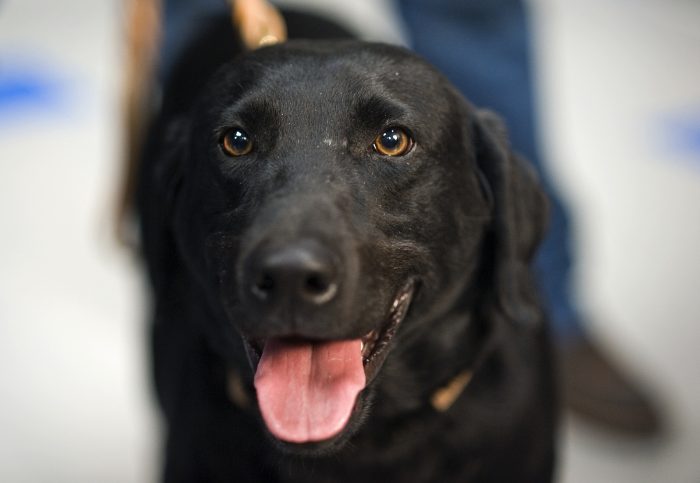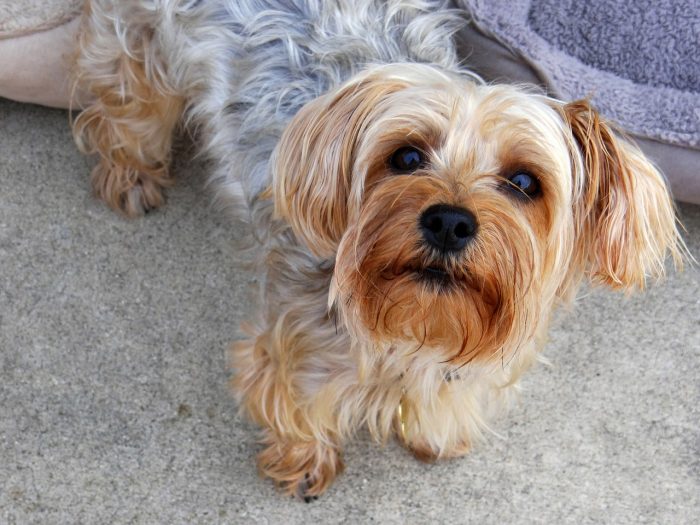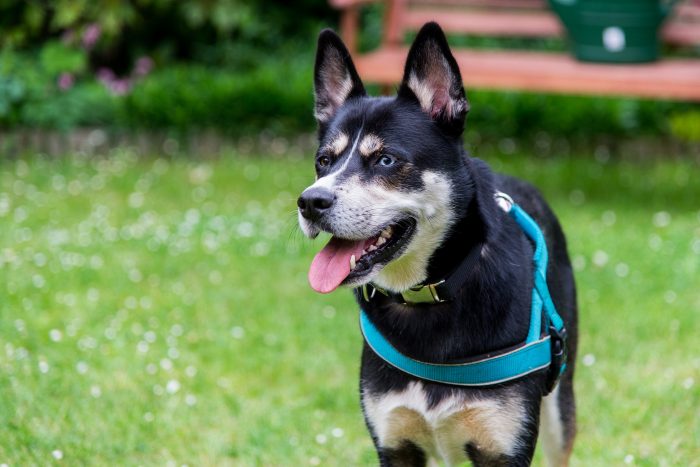A dry hacking cough from your pup is cause for concern for any dog owner, but can you differentiate between a regular cough and the highly contagious, kennel cough? And do you know what to do if your dog has it? While not overly serious on its own, it can lead to other medical issues and be a real problem for puppies.
Therefore, it’s best to educate yourself about dog kennel cough as well as common symptoms and treatments.
What Is Kennel Cough?
Canine infectious tracheobronchitis, more commonly known as kennel cough, is a highly contagious respiratory disease. Kennel cough in dogs features inflammation to the trachea and bronchi.
Kennel cough occurs when Bordetella bronchiseptica and canine parainfluenza virus get together and attack the lining in a dog’s respiratory tract, causing inflammation in the upper airway. This irritates the dog’s airways and causes a constant, dry cough.
Causes of Kennel Cough in Dogs
Kennel cough (infectious tracheobronchitis) is one of the most widespread health conditions in dogs. In fact, kennel cough was given its name because it can spread quickly through a kennel and infect every dog. It is spread when a sick dog coughs and releases his germs into the air, by direct contact with an infected animal or through the sharing of contaminated objects, such as toys or water bowls. It can be passed via airborne droplets, touching noses, or contaminated surfaces. Your dog can even pick up kennel cough from something as simple as greeting an infected dog during a walk or sharing drinks from a contaminated bowl at the dog park.
Kennel cough is most commonly contracted in an area where there are a lot of dogs, such as such as boarding kennels, animal shelters, day care facilities, veterinary waiting rooms, grooming salons, dog parks, training groups, and even dog shows. But kennel cough can spread especially rapidly anywhere that dogs congregate in close quarters.
Kennel cough is very similar to the human cold in that the conditions itself can be caused by a variety of factors. Several microorganisms can contribute to kennel cough, including Bordetella bronchiseptica bacteria, canine adenovirus, parainfluenza virus, and mycoplasma. They can cause symptoms of the disease alone or in some combination, but infections caused by multiple organisms will generally lead to the most severe symptoms.
The most common cause of these is Bordetella bronchiseptica, which is why kennel cough is sometimes called simply Bordetella. Most dogs that acquire Bordetella are already infected with some other virus at the same time. These viruses make the dog more susceptible to contracting the Bordetella infection, and can include canine adenovirus, canine distemper virus, canine herpes virus, parainfluenza virus, and canine reovirus.
More literally, dogs “catch” kennel cough when they inhale bacteria or virus particles into their respiratory tract. A dog’s respiratory tract is typically lined with a coating of mucus that traps infectious particles, but a dog can be prone to the kennel cough infection in cases where this mucus protection has been weakened. A number of factors can weaken a dog’s mucus protection, including:
- Exposure to crowded and/or poorly ventilated conditions. These conditions are often found in many kennels and animal shelters.
- Cold temperatures
- Exposure to dust or cigarette smoke
- Travel-induced stress
Once a dog contracts kennel cough, it will cause an inflammation of the larynx (voice box) and trachea (windpipe). If your dog does catch kennel cough, signs associated with the condition may appear three to four days after exposure to a large number of other dogs. Whenever your dog suddenly develops the characteristic dry, hacking cough, that seems like something is stuck in their throat that they can’t get out—kennel cough should be suspected.
What are the symptoms of kennel cough?
The most common symptom of kennel cough is a persistent, forceful cough that can sometimes sound like a goose honk.If you spend any amount of time around your dog, you should instantly be able to recognize the difference. The reverse sneeze is normal in certain breeds of dog, and usually just means your dog has some post-nasal drip or a slight throat irritation.
There are also several kennel cough symptoms that go beyond just the characteristic dry hacking cough. You may also notice some of the following symptoms:
- A runny nose
- Frequent sneezing
- General lethargy
- A loss of appetite
- A low fever
Some dogs may even encounter a minor eye discharge. Symptoms will develop shortly after exposure to an infected dog, but will subside rather quickly in most cases. Your dog should not showcase a loss of appetite and in most cases will not even have a decreased energy level.
And while kennel cough in general is nothing to worry about, you should still consider reporting a persistent cough to your veterinarian, as it may by a sign of something more serious than kennel cough. Canine distemper and influenza both start off with symptoms that are nearly identical to kennel cough. A collapsing trachea, bronchitis, asthma and even heart disease can also cause coughing that will sound similar to kennel cough.
A dog’s symptoms will usually diminish within five days, but in other, more severe cases, kennel cough symptoms may persist for up to 10 or even 20 days. However, kennel cough is almost always more annoying to the dog and its owner than it is harmful.
How is kennel cough diagnosed?
Kennel cough can be easily diagnosed by your veterinarian, even though there is no specific test for kennel cough. It is actually a process of exclusion, where your veterinarian will rule out other possible causes of your dog’s cough. These may include heart disease, fungal and parasitic infections like heartworm disease, a collapsing trachea, and cancer.
Your dog’s health history will also be considered, especially a newly acquired rescue from a shelter. But dogs from stores or breeders and dogs that have recently been boarded are also highly susceptible. You should also notify your vet if you recently visited the groomer, have gone to training classes, or participated in dog shows, or even just recently been to the dog park. Your vet should be able to determine whether or not they suspect kennel cough based on these factors.
In other cases, your veterinarian may order a combination of blood chemistry tests, a complete blood cell count, a urinalysis, fecal examinations, and even chest X-rays. Additional testing, such as bacterial cultures, may be conducted if your dog does not respond to treatment. This will be necessary to identify what microorganisms are causing the cough.
But in general, diagnosing your dog’s kennel cough will be an easy, non-invasive visit to the vet.
Kennel Cough Treatment
Kennel cough is most easily comparable to the common cold in human: It is highly contagious, is rarely fatal, and can be out of your dog’s system in as little as a few days. There are several ways you can help make your dog more comfortable, speed up his recovery, and even prevent future infections.
Mild cases of kennel cough can generally be treated just by giving your dog a week or two of rest. Your veterinarian may also prescribe some cough medicine to ease your dog’s symptoms and some antibiotics to prevent a secondary infection from forming. These include nebulizers and vaporizers that utilize inhaled antibiotics.
Beyond that, there is plenty you can do for your dog to help reduce the severity of your dog’s symptoms and make him more comfortable. First, humans cannot catch kennel cough, so no worries there. Moving on, here are some things you can do for your kennel cough-inflicted pup.
Use a harness rather than a collar when you go for walks. Traditional leashes can irritate the trachea and aggravate the cough, or even cause damage to the trachea. This is especially important for dogs that tend to tug on the leash.
If you have a household with multiple pets, try to separate your animals as much as you can so it does not spread between them. At the very least, you should definitely separate their food and water bowls to help prevent your sick dog from infecting the others.
You can also consider using a humidifier in the area your dog sleeps and spends most of his time to help moisten its throat. This should help minimize its coughing. Proper hydration and nutrition can also help alleviate your dog’s symptoms and get rid of the cough faster.
While most dogs with kennel cough will recover completely in a short period of time, if your dog’s cough persists, it may be time to go back into the vet. Serious, ongoing kennel cough can lead to pneumonia and other conditions.
What can I do to prevent my dog from getting kennel cough?
There are actually three vaccines available for canine kennel cough. One is an injectable vaccine, another is an intranasal vaccine delivered as a mist, and one is given orally. These vaccinations should help, but do not guarantee that your dog will never acquire kennel cough. This is because kennel cough can be caused by so many different bacteria or viruses. It’s also important to note that the kennel cough vaccination is not an effective treatment against an active infection.
Intranasal and oral kennel cough vaccinations are usually given yearly to dogs, but for those that are at a higher risk for infection, such as dogs that are frequently boarded, go to doggie daycare, or are otherwise often exposed to large groups of dogs, they will sometimes be given two doses at two to four week intervals, which is then followed by a booster every six months or a year. These forms provide a dog with protection against kennel cough faster than the injected product will.
As for preventative measures at home, make sure you take special care if you have a new puppy or recently rescued dog. You can soothe a coughing dog’s sore throat with honey or herbal teas. There are also natural preventatives, treatments, and immune-boosters that you should keep on hand to help prevent or treat the infection should they acquire it.
What dogs are more at risk for kennel cough?
There is no breed or genetic correlation to kennel cough, mainly just the environmental factors discussed above.
Kennel cough can affect dogs of any age but is most common in puppies, whose immune systems are still developing. Younger puppies often suffer the most severe complications that can result from the kennel cough virus because of their immature immune systems.
Older dogs that have conditions that decrease their immune capabilities are also more at risk to develop kennel cough. Pregnant dogs also have lowered immune function, as well as any dog with a preexisting respiratory disease.
Kennel cough also makes a dog more susceptible to a secondary infection. And while kennel cough is most common during the summer months, it can occur anytime.








